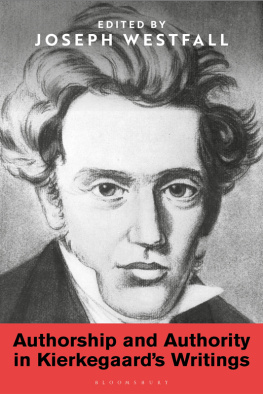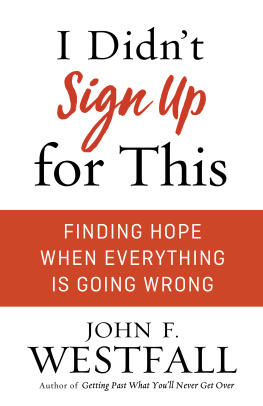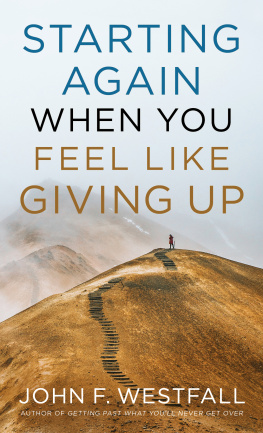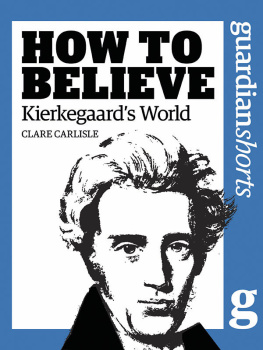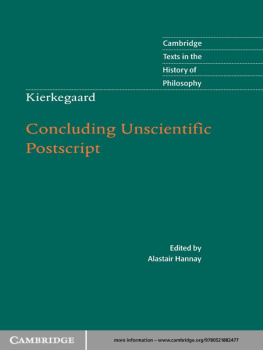Westfall - Authorship and Authority in Kierkegaards Writings
Here you can read online Westfall - Authorship and Authority in Kierkegaards Writings full text of the book (entire story) in english for free. Download pdf and epub, get meaning, cover and reviews about this ebook. publisher: Bloomsbury UK, genre: Art. Description of the work, (preface) as well as reviews are available. Best literature library LitArk.com created for fans of good reading and offers a wide selection of genres:
Romance novel
Science fiction
Adventure
Detective
Science
History
Home and family
Prose
Art
Politics
Computer
Non-fiction
Religion
Business
Children
Humor
Choose a favorite category and find really read worthwhile books. Enjoy immersion in the world of imagination, feel the emotions of the characters or learn something new for yourself, make an fascinating discovery.
Authorship and Authority in Kierkegaards Writings: summary, description and annotation
We offer to read an annotation, description, summary or preface (depends on what the author of the book "Authorship and Authority in Kierkegaards Writings" wrote himself). If you haven't found the necessary information about the book — write in the comments, we will try to find it.
Westfall: author's other books
Who wrote Authorship and Authority in Kierkegaards Writings? Find out the surname, the name of the author of the book and a list of all author's works by series.
Authorship and Authority in Kierkegaards Writings — read online for free the complete book (whole text) full work
Below is the text of the book, divided by pages. System saving the place of the last page read, allows you to conveniently read the book "Authorship and Authority in Kierkegaards Writings" online for free, without having to search again every time where you left off. Put a bookmark, and you can go to the page where you finished reading at any time.
Font size:
Interval:
Bookmark:
AUTHORSHIP AND AUTHORITY IN
KIERKEGAARDS WRITINGS
Also Available from Bloomsbury
Blake and Kierkegaard, James Rovira
Kierkegaard, Metaphysics and Political Theory, Alison Assiter
Errant Affirmations, David J. Kangas
Fiction and Art, edited by Ananta Sukla
Becketts Words, David Kleinberg-Levin
Poetry and Revelation, Kevin Hart
Kierkegaard, Julia Watkin
Kierkegaards Fear and Trembling: A Readers Guide, Clare Carlisle
AUTHORSHIP AND AUTHORITY IN
KIERKEGAARDS WRITINGS
Edited by
Joseph Westfall

In Memoriam
Robert L. Perkins
June 23, 1930March 20, 2018
A True Scholar, Teacher, and Friend
Daniel Berthold is Chair of the Department of Philosophy at Bard College. He is author of many articles on Kierkegaard, Hegel, Nietzsche, Heidegger, Camus, and topics in environmental ethics. His most recent book is The Ethics of Authorship: Communication, Seduction, and Death in Hegel and Kierkegaard (Fordham 2011).
Eleanor Helms received her Ph.D. from Fordham University in 2011 and is Associate Professor of Philosophy at California Polytechnic State University in San Luis Obispo. Her research interests include nineteenth- and twentieth-century Continental philosophy and aesthetics, primarily phenomenology and existentialism, with articles published in Res Philosophica (winner of 2013 essay prize) and Philosophy and Literature, as well as chapters in Kafkas Creatures: Animals, Hybrids, and Other Fantastic Beings (eds. Marc Lucht and Donna Yarri, Lexington Books, 2010) and Narrative, Identity, and the Kierkegaardian Self (eds. John Lippitt and Patrick Stokes, Edinburgh University Press, 2015). Her current research examines the role of authorial intent, beliefs, perception, and imagination in literary fiction.
Sarah Horton is a doctoral student in philosophy at Boston College. Her areas of interest include twentieth-century and contemporary French philosophy, desire, ethics, and the philosophy of literature. She is currently working on a phenomenology of friendship.
Edward F. Mooney is author of several Kierkegaard books, including Selves in Discord and Resolve (1996), On Sren Kierkegaard (2007), Excursions with Kierkegaard (2012), and Knights of Faith and Resignation (1991). He is also author of Lost Intimacy in American Thought (2009) and Excursions with Thoreau (2015). He is Emeritus professor in Philosophy and Religion, Syracuse University, and has taught at Hebrew University and Tel Aviv University.
George Pattison is 1640 Professor of Divinity in the University of Glasgow, having previously taught in the universities of Cambridge, Aarhus, and Oxford. He has published extensively on Kierkegaard, including Kierkegaard and the Quest for Unambiguous Life (2013) and Kierkegaard and the Theology of the Nineteenth Century (2012). He is also coeditor of the Oxford Handbook of Kierkegaard (2013).
M. G. Piety is Associate Professor of Philosophy at Drexel University. She has published numerous scholarly articles in professional journals and books, as well as popular articles and essays. Her translations of Sren Kierkegaards Repetition and Philosophical Crumbs for Oxford University Press appeared in 2009, and her book Ways of Knowing: Kierkegaards Pluralist Epistemology was published by Baylor University Press in 2010. Piety is a frequent contributor to the online political journal CounterPunch, and she is currently working on a book for Gegensatz Press entitled Fear and Dissembling: The Copenhagen Kierkegaard Controversy.
Robert C. Roberts writes on the thought of Kierkegaard and the moral psychology of emotions, virtues, and vices. He is the author of Faith, Reason, and History: Rethinking Kierkegaards Philosophical Fragments (Mercer University Press, 1986), Emotions: An Essay in Aid of Moral Psychology (Cambridge University Press, 2003), Spiritual Emotions (Eerdmans, 2007), Emotions in the Moral Life (Cambridge University Press, 2013), and coauthor with W. Jay Wood of Intellectual Virtues: An Essay in Regulative Epistemology (Oxford University Press, 2007). He is currently editing, with Daniel Telech, The Moral Psychology of Gratitude (Rowman and Littlefield) and writing a book tentatively titled Kierkegaards Psychology of Character (Eerdmans). He has also published numerous articles on Kierkegaards thought, emotions, and virtues and vices. He has taught philosophy at Western Kentucky University, Wheaton College, and Baylor University. He retired in 2015 from the Baylor philosophy department.
Michael Strawser is Chair of the Department of Philosophy and Associate Professor of Philosophy at the University of Central Florida. His primary philosophical interests and research areas are the philosophy of love, ethics, and the history of modern and contemporary philosophy with emphasis on Sren Kierkegaard, Baruch Spinoza, and the Continental tradition. He has previously published Both/And: Reading Kierkegaard from Irony to Edification (Fordham University Press, 1997), Asking Good Questions: Case Studies in Ethics and Critical Thinking (with Nancy Stanlick, Hackett Publishing, 2015), and Kierkegaard and the Philosophy of Love (Lexington Books, 2015).
Sylvia Walsh is currently Scholar in Residence at Stetson University, and she has been an adjunct professor and visiting associate professor in philosophy at Stetson University in DeLand, Florida, since 1989. Previously she taught religious studies at Clark College and Emory University in Atlanta, GA. She holds an A.B. degree from Oberlin College, M.A. in Religion from Yale University, and Ph.D. from Emory University. She is the author of Kierkegaard: Thinking Christianly in an Existential Mode (Oxford, 2009), Living Christianly: Kierkegaards Dialectic of Christian Existence (Penn State, 2005), and Living Poetically: Kierkegaards Existential Aesthetics (Penn State, 1994); coeditor and translator of Kierkegaards Fear and Trembling (Cambridge, 2006); editor and translator of Kierkegaards Discourses at the Communion on Fridays (Indiana University Press, 2011); and coeditor of Feminist Interpretations of Sren Kierkegaard (Penn State, 1997). She has presented numerous scholarly papers at regional, national, and international meetings and has published many articles and reviews in academic journals and books. In 1985, she was selected to direct the first National Endowment for the Humanities Summer Seminar for College Teachers on Kierkegaard. She has served twice as president of the Sren Kierkegaard Society in the United States and has been a member of the advisory board of the International Kierkegaard Commentary, as well as co-chair of the Kierkegaard, Religion, and Culture Group in the American Academy of Religion. In retirement, she is active in political activities and continues to do research and writing on Kierkegaard.
Sophie Wennerscheid is Professor in Scandinavian Literature at Ghent University, Belgium. She is the author of the books Das Begehren nach der Wunde. Religion und Erotik im Schreiben Kierkegaards (Desire for the Wound. Religion and Eroticism in Kierkegaards Writing, 2008) and Close Your Eyes. Phantasma, Kraft und Dunkelheit in der skandinavischen Literatur (Close Your Eyes. Phantasm, Force and Darkness in Scandinavian Literature, 2014). Together with Armen Avanessian, she edited the book
Next pageFont size:
Interval:
Bookmark:
Similar books «Authorship and Authority in Kierkegaards Writings»
Look at similar books to Authorship and Authority in Kierkegaards Writings. We have selected literature similar in name and meaning in the hope of providing readers with more options to find new, interesting, not yet read works.
Discussion, reviews of the book Authorship and Authority in Kierkegaards Writings and just readers' own opinions. Leave your comments, write what you think about the work, its meaning or the main characters. Specify what exactly you liked and what you didn't like, and why you think so.

